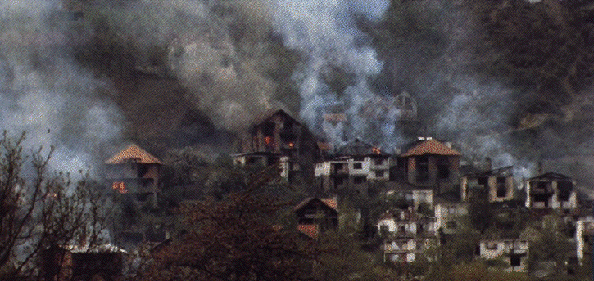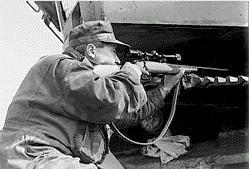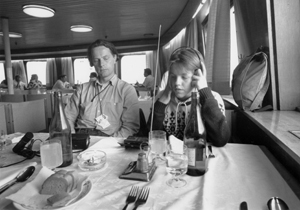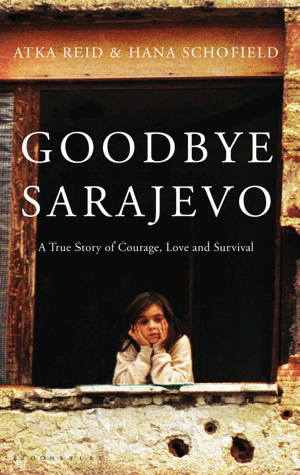
The Road Out Of Bosnia
The Daily Telegraph — 12-05-1992 14:00hrs
A human catastrophe is unfolding in the Balkans as thousands of refugees are driven from their homes in Bosnia-Hercegovina. Christopher Long met them in Split, Croatia, and spoke with front line commanders who control the vital escape routes.

A
s the bombardment of Mostar in south-east Hercegovina continued today (Tuesday), EC monitors here in Split were hopeful that negotiations yesterday between themselves and the warring Serbs and Hercegovinan Croats will have permitted the safe evacuation [from Sarajevo] of their nine [later thirteen] EC colleagues now being pulled out of Sarajevo to the Split headquarters.
The route taken by the retreating monitors in three vehicles should nevertheless be considerably safer than the appalling conditions now being faced by the trail of human misery pouring out of Hercegovina towards the relative safety of Croatian coastal resorts.
Packed buses of exhausted and bewildered women and children from towns and mountain villages arrive here in Split in their thousands, often dehydrated and always aggravating an already serious problem for the Red Cross, the local authorities and the newly arrived officers of the United Nations High Commissioner for Refugees. Usually reliable official estimates put the total number of refugees forced out of Bosnia-Hercegovina by Serbian advances at around 250,000 – mostly Muslims. A further 400,000 are believed to be displaced within their borders.
 Two days ago 1,500 women and children arrived and were then shipped north to Rijeka because the two large sports centres in Split could not accommodate them – making a total of about 36 hours in transit with no more food or possessions than they could carry with them. Later that night another 100 children from Mostar arrived at the Split harbour bus depot and are now destined for sanctuary on islands such as Brac, Hvar and Korcula.
Two days ago 1,500 women and children arrived and were then shipped north to Rijeka because the two large sports centres in Split could not accommodate them – making a total of about 36 hours in transit with no more food or possessions than they could carry with them. Later that night another 100 children from Mostar arrived at the Split harbour bus depot and are now destined for sanctuary on islands such as Brac, Hvar and Korcula.
 More serious, however, is the imminent withdrawal from Bosnia-Hercegovina of most international agencies. I have just visited the Croat-Hercegovinan military headquarters at Grude, 30 miles north-west of Mostar yesterday where, during the fifth air-raid alert before lunch, Col. Petkovic was confident that his 6,500 troops at the Imotski-Grude front line around northern Mostar could hold out in the long-term, but was pessimistic that the single dirt-track mountain road out of Mostar could be kept open – let alone safe – for the thousands of refugees expected to be forced north and west or trapped between the opposing sides. This road has stretches which are directly under the longer-range Serbian guns and provide rich pickings for Serbian air attacks.
More serious, however, is the imminent withdrawal from Bosnia-Hercegovina of most international agencies. I have just visited the Croat-Hercegovinan military headquarters at Grude, 30 miles north-west of Mostar yesterday where, during the fifth air-raid alert before lunch, Col. Petkovic was confident that his 6,500 troops at the Imotski-Grude front line around northern Mostar could hold out in the long-term, but was pessimistic that the single dirt-track mountain road out of Mostar could be kept open – let alone safe – for the thousands of refugees expected to be forced north and west or trapped between the opposing sides. This road has stretches which are directly under the longer-range Serbian guns and provide rich pickings for Serbian air attacks.
"The EC monitors are very good at forming agreements on paper," he told me wryly in his bunker HQ at the Hotel Dubrovnik in Grude. "But that's all they are good for," he added after a three-hour session with the leader of the Split EC monitor team, Dieter Waltman, former German ambassador to Baghdad. In Petkovic's view the war is now so dirty, inhuman and devoid of principles that such agreements for the safe passage of refugees, or even diplomats, are largely meaningless.
The Serbs seldom if ever abide by the limited cease-fire timings, he claims, though EC monitors would stress that Croat-Hercegovinan troops are not entirely blameless either. The thankless task of the monitors, who are merely here to observe and where possible liaise between the warring factions, is made no easier by increasingly irritated Croats who believe the monitors should be partisan peacekeepers.
 Amid bomb-shattered apartment blocks at Grude, hundreds of young, tanned soldiers sport uniforms and 9mm weapons from around the world, their conversation ranging from horrendous tales of enemy atrocities perpetrated on prisoners and innocent civilians to the baffled truism of a young ship's cook, now manning an ack-ack position over-looking Mostar, who simply asks me: "What have we done to each other? What have we Croats and Serbs done to be in this position?"
Amid bomb-shattered apartment blocks at Grude, hundreds of young, tanned soldiers sport uniforms and 9mm weapons from around the world, their conversation ranging from horrendous tales of enemy atrocities perpetrated on prisoners and innocent civilians to the baffled truism of a young ship's cook, now manning an ack-ack position over-looking Mostar, who simply asks me: "What have we done to each other? What have we Croats and Serbs done to be in this position?"
The big question now is how the war will develop under the newly appointed Serbian commander in Hercegovina, General Panic. He is well known to his former brother-officer in the JNA – now his adversary in Grude, Col. Petkovic.
"I can only say that things will get worse," says Col. Petkovic.
"He is the most hardline of hardliners and I expect him to destroy what he knows he cannot win." He adds that his own troops are sufficiently well-armed with identical weaponry to that ranged against them for him to be confident of long-term success – despite his total lack of air cover.
 And he agrees that the next major move in the war may depend as much on whether Belgrade can prevent civil revolt within Serbia itself as with any strategic decision to isolate Southern Croatia or move the conflict further south towards Kosovo.
And he agrees that the next major move in the war may depend as much on whether Belgrade can prevent civil revolt within Serbia itself as with any strategic decision to isolate Southern Croatia or move the conflict further south towards Kosovo.
Meanwhile it seems clear that the almost unprecedented savagery of the present battles in Bosnia-Hercegovina have finally left the innocent civilian population to a distinctly grim future without even the major international agencies able to monitor their fate.
 Despite months of warning from those on the ground (Nov 1991 – Feb 1992), Western governments were caught off-guard and quite unprepared for the human disaster which swept across Bosnia-Hercegovina in the Spring of 1992.
Despite months of warning from those on the ground (Nov 1991 – Feb 1992), Western governments were caught off-guard and quite unprepared for the human disaster which swept across Bosnia-Hercegovina in the Spring of 1992.
As Serbs and Croats pushed west and east respectively – grabbing territory, destroying houses and villages and slaughtering or driving homeless refugees before them – only popular frustration persuaded European politicians to act as the irrational brutality spread unchecked.
Their response was to send EC Monitors to 'observe and mediate where possible'.
This policy only reassured the brutal militias that nothing need stop them in their plan to partition Bosnia along ethnic/nationalist lines.
 Pictured left: is the author and Hana Kafedzic on a ferry heading north from Split to Rijeka in May 1992.
Pictured left: is the author and Hana Kafedzic on a ferry heading north from Split to Rijeka in May 1992.
Much of the Dalmatian coast surrounding the port of Zadar was then in the hands of JNA/Serb forces which put ferries at risk and required shipping to make wide detours to avoid coastal batteries and possible air attacks.
Hana and Nadija were safely handed over to an elderly couple in Rijeka before spending months in a refugee camp in Croatia. But they were among the lucky few who were allowed to escape the appalling conditions in Sarajevo during the siege.
 The large Kafedzic family, like thousands of others, escaped Sarajevo in ones and twos and eventually found themselves scattered throughout Europe.
The large Kafedzic family, like thousands of others, escaped Sarajevo in ones and twos and eventually found themselves scattered throughout Europe.
After meeting the author in Split and travelling together to Rijeka, Hana (12) and Nadja (16) spent months alone in refugee camps in Croatia. Some weeks later the author took a train to Smethwick, near Birmingham, to meet, interview but mostly to reassure their mother Fatima who was then staying there in a refugee centre for women.
In October 1992 he was based in Zagreb while making front line tours in and around Sarajevo. It was in Zagreb that he frequently met Fatima, Nadja, Hana and their 17 year-old sister Ekrima.
Eventually, following the relentless efforts of their elder sister, Atka (greatly helped by her war-photographer husband Andrew), the entire family was slowly reunited and offered a home in New Zealand. Each of them reacted to the traumas of the Bosnian war in their own way – none of them easy.
Left: The Kafedzic family on the day they were granted New Zealand citizenship – five years after being scattered throughout Europe.

 The author has remained in contact with the Kafedzic family and particularly with Nadja, Ekrima and Hana.
The author has remained in contact with the Kafedzic family and particularly with Nadja, Ekrima and Hana.
Left: Nadja Kafedzic with her son Luca. She now lives in New Zealand with her daughter Romana.
In July 2009 the author was very happily reunited with Hana who visited him in France, 17 years after they had last met.
Newly married and accompanied by her husband James, Hana and the author found it much easier than they had feared to re-live painful memories as she prepared a book, co-authored with her sister Atka Reid, on their family's Bosnian war experiences.
Left: The author (left) with Hana Kafedzic (right), reunited in July 2009 in Normandy. Between them is James Schofield, Hana's husband since their marriage in New Zealand in January 2009.
 In May 2011, Hana Schofield and her sister Atka Reid published Goodbye Sararajevo (Bloomsbury Publishing), an excellent and touching personal account of the Balkan wars and in particular the consequences, for them and the rest of their large family, of the war in Bosnia. Their Goodbye Sarajevo web site says:
In May 2011, Hana Schofield and her sister Atka Reid published Goodbye Sararajevo (Bloomsbury Publishing), an excellent and touching personal account of the Balkan wars and in particular the consequences, for them and the rest of their large family, of the war in Bosnia. Their Goodbye Sarajevo web site says:
"May, 1992. Hana is twelve years old when she is put on one of the last UN evacuation buses fleeing the besieged city of Sarajevo. Her twenty-one-year-old sister, Atka staying behind to look after their five younger siblings, is there to say goodbye. Thinking that they will be apart for only a few weeks, they make a promise to each other to be brave.
But as the Bosnian war escalates and months go by without contact; their promise to each other becomes deeply significant. Hana is forced to cope as a refugee in Croatia, far away from home and family, while Atka battles for survival in a city where snipers, mortar attacks and desperate food shortages are a part of everyday life. Their mother, working for a humanitarian organisation, is unable to reach them and their father retreats inside himself, desperately shocked by what is happening to his city. In Sarajevo, death lurks in every corner and shakes the foundation of their existence. One day their beloved uncle is killed while queuing up for bread in the market square, in a massacre similar to the one three months earlier which prompted a cellist to make a lone protest in the deserted street. But when Atka finds work as a translator in an old smoky radio station, and then with Andrew, a photojournalist from New Zealand, life takes an unexpected turn, and the remarkable events that follow change her life, and those of her family forever.
Set in the middle of the bloodiest European conflict since the Second World War, Goodbye Sarajevo is a moving and compelling true story of courage, hope and extraordinary human kindness.
In November 2008 the author was delighted to get the following message regarding the 16 year-old refugee, Zenaida/Zinaida/Zina, who appears in this article. He had not had news of her for 16 years and until then had no idea if or how she had survived the tragic war in former Yugoslavia.
"Christopher, I was with the U.S. IPTF (Police Task Force) in Bosnia 98-03. You wrote an article in 1992 including a refugee Zenaida... I thought you might like to know what happened to her as she shared with me how you were really concerned and had the respect of the refugees. 'Zina' is now in the Atlanta Georgia area working for me... now the manager of the business with a modest salary and bonuses, a beautiful daughter and, of all the bad she went through, she remembers those that care. After leaving Split the journey was still hard ahead for all of them. Thank you for being a reporter that cares. You should know that years later your impact of kindness may never be forgotten. I hope this mail finds you and in good health."
 Despite months of warning from those of us on the ground (Nov 1991 – Feb 1992), Western governments were caught off-guard and quite unprepared for the human disaster which swept across Bosnia-Hercegovina in the Spring of 1992. As Serbs and Croats pushed west and east respectively, grabbing territory, destroying houses and villages and slaughtering or driving homeless refugees before them, only popular frustration persuaded European politicians to act as the irrational brutality spread unchecked. Their response was to send EC Monitors to 'observe and mediate where possible'. This policy only reassured the brutal militias that nothing need stop them in their plan to partition Bosnia along ethnic/nationalist lines.
Despite months of warning from those of us on the ground (Nov 1991 – Feb 1992), Western governments were caught off-guard and quite unprepared for the human disaster which swept across Bosnia-Hercegovina in the Spring of 1992. As Serbs and Croats pushed west and east respectively, grabbing territory, destroying houses and villages and slaughtering or driving homeless refugees before them, only popular frustration persuaded European politicians to act as the irrational brutality spread unchecked. Their response was to send EC Monitors to 'observe and mediate where possible'. This policy only reassured the brutal militias that nothing need stop them in their plan to partition Bosnia along ethnic/nationalist lines.
In 1996 The International Criminal Tribunal for the former Yugoslavia (The Hague) asked Christopher Long to supply prosecutors with a copy of his taped interview with Col. Petkovic. He was also asked to make a formal evidential statement. Ten years later Milivoj Petkovic appeared before the Tribunal to face nine counts of crimes against humanity, eight counts of violations of the laws or customs of war and eight counts of grave breaches of the Geneva Conventions. In May 2013 it was announced that Petkovic had been found guilty and sentenced to 20 years in prison.
Bosnia's Girl Refugees (The Evening Standard)
Bosnia's Tide of Human Misery (The Observer News Service)
© (1992) Christopher A. Long. Copyright, Syndication & All Rights Reserved Worldwide.
The text and graphical content of this and linked documents are the copyright of their author and or creator and site designer, Christopher Long, unless otherwise stated. No publication, reproduction or exploitation of this material may be made in any form prior to clear written agreement of terms with the author or his agents.